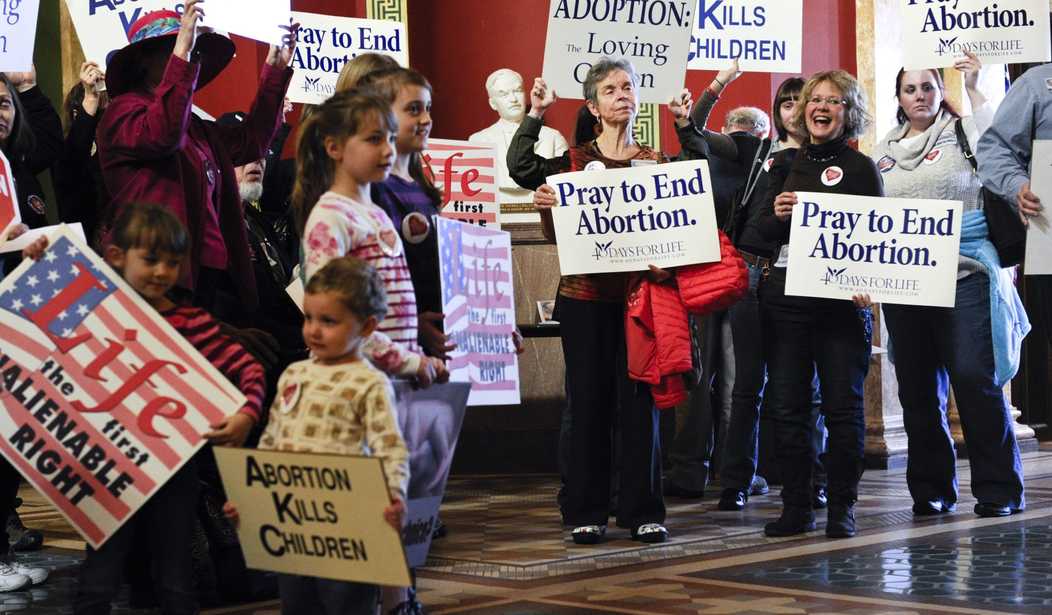South Carolina GOP state Rep. Josiah Magnuson told the Spartanburg County Republican Party last month he’s tired of nibbling around the edges of legalized abortion.
“The only way to slay the dragon is through the heart of Roe v. Wade,” Magnuson explained. “We need to remember our goal — to end abortion.”
The pro-choice Guttmacher Institute trumpeted a warning in December picked up by Vice News — Republicans had pre-filed at least 17 state legislative proposals to limit abortions.
Among the 17 is Magnuson’s bill to recognize the right to life begins at conception, a concept known as fetal personhood. The legislation would outlaw abortion with very few exceptions.
Under Magnuson’s proposal, an abortion would be allowed if the mother was in danger of dying. But cases of rape and incest are not addressed in Magnuson’s proposal. Contraception and in-vitro fertilization would be permitted.
Magnuson’s legislation states “the rights of its citizens extend to each newly born and pre-born human being.”
“The Personhood Act will define life at conception so that all humans are protected under state law, regardless of age,” Magnuson said. “The dark trade must end. Now is the time to end abortion in South Carolina.”
This move by Magnuson is the second time South Carolina’s pro-life legislators have tried to win approval for a fetal personhood proposal. Last year, an effort to do so failed. But Gov. Henry McMaster (R) issued a February 2018 statement in which he promised to sign fetal personhood legislation.
“There will be a day when everyone will understand clearly that the right to life is the most important right there is, that life begins at conception, it is a God-given right, and we must do all we can to protect it,” McMaster said in a speech on the floor of the South Carolina State House marking Personhood Day 2018.
“There’s been nobody more committed to pro-life legislation than Gov. McMaster, and there’s absolutely no reason to expect that to change in the coming legislative session,” McMaster spokesman Brian Symmes said.
South Carolina state Sen. Richard Cash (R) said in December that he’d introduce a Senate version of the Personhood Act this year.
“We’ve got a governor now that signed the Personhood pledge,” said state Sen. Shane Martin, (R) a personhood supporter. “I’m hoping that with our fight and the governor’s support, we can get some of these so-called pro-life Democrats and Republicans to actually vote pro-life.”
Despite Martin’s optimism, pro-choice legislators are promising to fight as hard as they did last year.
South Carolina Sen. Marlon Kimpson (D) promised to filibuster “any piece of legislation that would erode a woman’s right to choose and make a personal decision without the interference of the government.”
“As far as I’m aware, Roe v. Wade is the law of the land, and until that’s changed, I think they’re (personhood supporters) wrong,” Kimpson added.
But Rep. Magnuson isn’t worried about what Kimpson and other Democrats might do.
“We have a great chance this year … to make sure we are protecting all life as the Constitution requires,” Magnuson said. “No life can be taken without due process of law, and I believe that is the state’s highest responsibility.”
Iowa GOP Sen. Jason Schultz tried, and failed, in 2018 to get a personhood bill through his legislature.
Schultz told Radio Iowa that there wouldn’t be another attempt in 2019. Schultz said he’d wait to see what happened in the courts with Iowa’s new “heartbeat” abortion bill before introducing personhood legislation again.
However, Alabama voters in November approved Amendment 2, which grants state constitutional rights to fertilized eggs and fetuses.
Pro-choice advocates are worried about the fetal personhood debate.
Toni Van Pelt, the president of the National Organization for Women, said personhood laws are “a dangerous new front in the far-right’s attack on reproductive rights.”
“It is beyond irony that Donald Trump and his allies in the states fiercely oppose an Equal Rights Amendment for women, and now want to shred our Constitution to grant personhood status to the fetus,” Van Pelt added.
She also pointed to a New York Times editorial series that warned women who miscarry could become criminals under fetal personhood laws.
“These criminal statutes are results of a tried-and-true playbook, part of a strategic campaign to establish fetal rights, reverse Roe v. Wade and re-criminalize abortion. The sequence begins with anti-abortion groups seizing upon a tragic case in which a woman loses her pregnancy because of someone else’s actions,” the New York Times stated.
“Public outcry then helps to strengthen a state feticide law that recognizes such lost pregnancies as murder or manslaughter. It’s a backdoor way of legally defining when life begins,” the NYT also wrote.
Bill Donohue, the president of the Catholic League, said the editorial was “the moist rabid defense of abortion ever published by the mainstream media.”
“What is really gnawing at the Times is the recent emergence of laws protecting the personhood of unborn babies,” Donohue added.
“It may take some time before the idea of granting personhood status to unborn babies catches on nationwide, but the vector of change is moving that way,” Donohue concluded. “This is why the New York Times sees this as such a frightening prospect.”









Join the conversation as a VIP Member